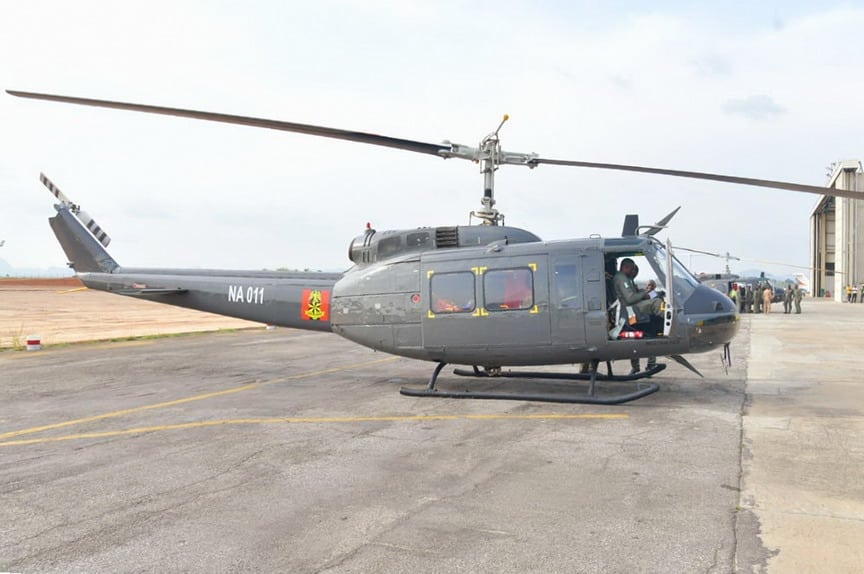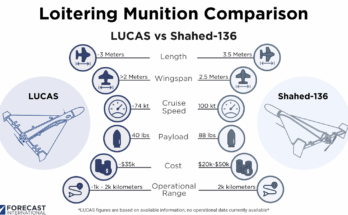
In June, the Nigerian Army achieved a significant milestone by acquiring two UH-1H “Huey” helicopters, formally establishing its new Aviation Wing. This move is part of a broader strategy to enhance air support capabilities, focusing on surveillance, reconnaissance, and med-evac missions. The initiative coincides with escalating violence in the region as attacks perpetrated by Boko Haram and Islamic State West Africa (ISWAP) surged in the aftermath of the recent French military withdrawal from the Sahel. Neighboring countries have similarly taken to increasing their defense capabilities. Although the absence of Western troops has brought debate over regional stability, Nigeria and its neighboring states have seized the opportunity to advance their military capabilities, giving new military prowess to West Africa.
Army Aviation Wing
The Army Aviation Wing plans to integrate advanced crewed and uncrewed platforms including the Cayuse Warrior Scout (36 ordered), Bell 412EP, Eurocopter EC135, and Bell UH-1D utility helicopter, alongside fixed-wing aircraft like the MF-212 light aircraft (20 units ordered). Autonomous platforms include the Textron Aerosonde UAS, Chinese Ziyan UAS Blowfish and Turkish Bayraktar TB2 UAVs.
Nigeria allocated $3.2 million to construct the first aviation hangar at Bola Ahmed Tinubu International Airport to accommodate the new fleet.
Unlike the Nigerian Air Force, which operates aircraft designed for high-altitude missions and aerial bombardment, the Army Aviation Wing will utilize helicopters and low-flying aircraft for close-air support, crucial for counter-insurgency.
Groups like Boko Haram and ISWAP utilize hit-and-run tactics, ideal in rugged terrain, and effective in evading traditional counter-insurgency efforts. The Army hopes to counter these tactics using helicopters and low-flying aircraft, which excel in navigating diverse terrains, to gain a competitive edge over the enemy.
The Nigerian Army has garnered support from the French Army and California National Guard and signed a contract with India’s Hindustan Aeronautics Limited (HAL) to ensure quality training for its new unit.
The 2024 defense budget further underscores this commitment with a substantial NGN 2.6 trillion (about $2.8 billion) allocation to establish the aviation wing.
Geopolitical Backdrop
Abuja’s military expansion is a calculated response to escalating cross-border violence. The withdrawal of French troops from Mali in February 2022 had significant repercussions, paving the way for increased extremist violence in the Sahel and Lake Chad Basin. From 2022 to 2023, fatalities linked to militant Islamist violence rose by 20 percent – doubling from 2021.
In Nigeria, the actions of Boko Haram and Islamic State West Africa Province (ISWAP) displaced over 3 million people, exacerbating the refugee crisis across the Sahel. Previously, the French military presence in Mali curbed these groups by disrupting their supply lines and operations. However, without this pressure, Boko Haram and ISWAP mobilized more freely, increasing attacks in northeastern Nigeria.
Regional instability is further complicated by foreign actors seeking to capitalize on the power vacuum. Russia’s Wagner Group (rebranded as African Corps) has piggy-backed on the anti-Western sentiments sewn by the regimes of the six successful coups since 2020. Russia’s African Corps has participated in countless disinformation campaigns and violent episodes, further undermining efforts towards peace.
The upcoming withdrawal of U.S. forces from neighboring Niger in September 2024 threatens to worsen the security situation. Nigeria shares a 2,000 miles long border with Niger, Chad and Cameroon, with nearly 1,500 unmonitored crossing points.
Facing the Threat
Responding to these challenges, Nigeria has bolstered its capabilities across its armed forces. In addition to purchases made by the Nigerian Army, the country’s Air Force announced plans to procure 50 aircraft, including 12 AH-1 attack helicopters, 24 M-346 combat planes, 12 AW109 multipurpose helicopters, and two Casa 295 transport aircraft to be delivered in 2025. The combined mission versatility and payload potential of these aircraft add a high degree of flexibility to Nigeria’s defense operations.
Additionally, Nigeria is enhancing its border security, considering the introduction of state police across all 36 states to supplement the national police force. This move aims to meet international standards, including the United Nations’ recommendation of one police officer per 450 citizens.
Other Notable military procurements include deliveries of Edjer 6×6 armored vehicles from Turkiye (Jan. 2023), Buffalo E10 6×6 Mine-Resistant Ambush Protected Vehicles (MRAPs) and Temsah-2 from Egypt (Jan. 2024) to Burkina Faso and VP14 and VP11 MRAPs from China (June 2024, April 2023) to Burkina Faso and Mali.
Aja Melville is an accomplished editor and analyst with expertise in open-source intelligence (OSINT) and database management. As the Weapons Editor and Analyst at Military Periscope, Aja has applied her analytical skills and in-depth knowledge in military affairs and global defense sector advancements, particularly focusing on China and the Asia-Pacific region.
Aja's commitment to international relations and Asia-Pacific focus is highlighted by her educational background. She holds a Bachelor of Arts in International Relations and Chinese Language from Bard College, complemented by a Certificate of Advanced International Studies from the Bard Globalization and International Affairs Program. Aja further expanded her linguistic skills with a Certificate of Intensive Language Studies in Chinese (Mandarin) from Qingdao University.




